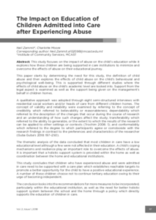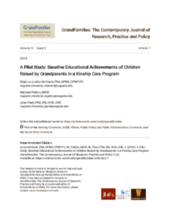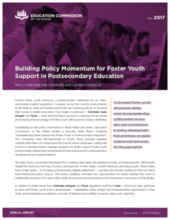Displaying 171 - 180 of 349
It is well documented that children placed in out-of-home care in Denmark perform poorly on a wide range of short-term and long-term outcomes compared to other children. This paper describes the core components of an innovative project that will attempt to address some of the major weaknesses of previous interventions and which, if successful, will be rolled out across foster care families nationwide.
This study focuses on the impact of abuse on the child’s education while it explores how these children are being supported in care institutions to minimize and overcome the effects of abuse on their educational journey.
This paper examines the post-compulsory educational pathways of young people who have spent some or all of their childhoods in local authority.
This paper identifies key educational outcomes among young people in care in Ontario (Canada) of pre-school, elementary, secondary, and post-secondary age.
This pilot study reports the baseline data of a prospective longitudinal study examining the educational achievements of grandchildren being raised by grandparents in parent absent homes.
This special report from the Education Commission of the States describes initiatives and policy changes underway in the US that support foster youth in pursuing postsecondary education.
This study examined factors associated with extracurricular participation and whether participation in extracurricular activities is associated with completing high school and attending college among a sample of older youth transitioning from foster care (n = 312).
This study examined factors associated with extracurricular participation and whether participation in extracurricular activities is associated with completing high school and attending college among a sample of older youth transitioning from foster care.
The purpose of this study was to determine the proportion of school moves that can be reduced through implementation of the educational stability provisions of the Fostering Connections to Success and Increasing Adoptions Act (FCA, 2008) and the Every Student Succeeds Act (ESSA, 2015), and to identify opportunities to minimize the number of transitions that children and youth in foster care experience in the US.
This study employed Concept Mapping (CM) with a convenience sample of 51 foster youth/alumni in one southeastern state in the US to explicate a conceptual framework for the development of campus supports for collegiate foster youth/alumni, and examine priority areas (e.g., importance and feasibility).



